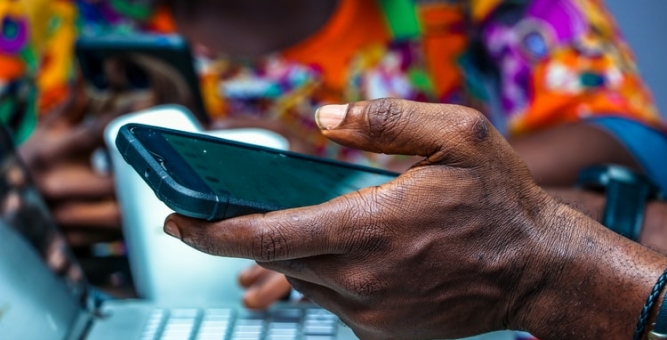Par Ashnah Kalemera et Simone Toussi |
L’utilisation croissante des technologies numériques en Afrique est entrain de faciliter les activités de traite de personnes dans la région. Cependant, ces mêmes technologies peuvent être mises à profit pour lutter contre ce fléau qui sévit sur le continent.
Avec le soutien du Fonds Africain pour les Droits Numériques (ADRF), le think tank juridique africain sur les droits des femmes (ALTOWR : African Legal Think Tank on Women’s Rights ) a étudié le rôle que joue l’internet pour faciliter la traite des êtres humains notamment dans les volets recrutement et publicité en ligne en République démocratique du Congo (RDC), en Gambie et en Mauritanie. En plus de résultats instructifs, le projet a produit un programme de renforcement de capacités sur la façon dont l’internet peut être utilisé pour faciliter ou mieux combattre la traite des êtres humains.
Selon le rapport annuel sur la traite des personnes (annual Trafficking in Persons Report), diverses formes de traite d’êtres humains sont pratiquées dans plusieurs pays africains. En 2020, pour 10 victimes de la traite, cinq étaient des femmes adultes et deux des filles. La RD Congo, la Gambie et la Mauritanie font partie des pays du continent où sévit ce fléau.
L’indice mondial de l’esclavage (Global Slavery Index), qui fait des statistiques à propos des lieux où l’esclavage moderne est pratiqué (travail forcé, traite des êtres humains et mariages forcés) et les réponses gouvernementale à ce phénomène a classé les trois pays au 12ème, au 58ème et au 6ème rangs respectivement, sur un total de 167 pays étudiés au niveau mondial. Avec des taux de pénétration de l’internet de 19,2 % en RD Congo, de 63 % en Mauritanie et de 19 % en Gambie, les réseaux de traite des êtres humains dans ces pays s’appuient de plus en plus sur l’internet et les plateformes de médias sociaux pour recruter leurs victimes.
En RD Congo, on estime le nombre de victimes de la traite à plus d’un million, soumis . Dans la plupart du temps « au travail forcé dans les sites miniers artisanaux, à l’agriculture, à l’esclavage domestique, ou au recrutement d’enfants par des groupes armés pour le combat ou le soutien aux combattants, ainsi qu’au trafic sexuel ».
En effet, l’étude d’ALTOWR a révélé que les déplacements de populations causés par les conflits armés en RD Congo ont créé un environnement favorable à l’exploitation des communautés vulnérables. L’étude détaille des cas d’esclavage sexuel et de mariages forcés dans la capitale du pays, Kinshasa, ainsi qu’au Rwanda voisin ; des migrations clandestines vers l’Afrique du Sud via le Burundi et la Tanzanie ; et des enlèvements, ce qui entraine des maladies sexuellement transmissibles, notamment le VIH/SIDA, des grossesses non désirées et le paiement de lourdes rançons. Comme résultats de toutes les études de cas, il ressort que les auteurs de ces délits ont utilisé des plateformes de médias sociaux, notamment Facebook et WhatsApp, pour attirer leurs victimes.
Pour en savoir plus, lire : Le rôle de l’internet dans la croissance de la Traite des êtres humains en République Démocratique du Congo
En Gambie, on estime que 11 000 personnes sont victimes d’esclavage moderne, sur une population totale avoisinant deux millions d’habitants. Les femmes, les filles et, dans une certaine mesure, les garçons gambiens sont victimes du trafic sexuel et du travail forcé, et cela est favorisé par le fort dynamisme du secteur touristique dans ce pays.
La loi gambienne contre la traite des êtres humains a été adoptée en 2007 et le pays a créé l’agence nationale anti traite des personnes (National Agency Against Trafficking in Persons), dont les activités ont débuté en 2013 mais entravées par un manque ressources suffisantes. En conséquence, l’étude d’ALTOWR a révélé que les efforts pour poursuivre les auteurs de la traite des personnes s’avèrent «insignifiants ». Parmi les cas étudiés, notamment ceux de la traite des Gambiens vers le Moyen-Orient, il a été prouvé que la logistique du voyage est organisée en ligne.
Lisez plus de détails : Le rôle de l’Internet dans la croissance de la traite des êtres humains en Gambie
Entre-temps, les réformes contre la traite et le trafic de personnes en Mauritanie ne produisent pas les résultats escomptés. En effet, cette forme d’esclavage moderne «est ancrée dans la société, le statut d’esclave étant hérité et profondément ancré dans les castes sociales et le système social en général », dans un pays où l’on estime le nombre de victimes à 90 000 sur une population de quatre millions d’habitants. Située à cheval entre l’Afrique du Nord et l’Afrique subsaharienne, et dotée d’une frontière longue et poreuse, la Mauritanie constitue une voie de transit privilégiée pour les passeurs et les trafiquants entre l’Afrique, l’Europe et le Moyen-Orient.
Pour en savoir plus, lire : Le rôle de l’internet dans la croissance de la traite des êtres humains en Mauritanie
En Afrique, les trafiquants d’êtres humains utilisent internet pour identifier, recruter, contraindre et contrôler les victimes, ainsi que pour faire la publicité de services ou produits. Ils l’utilisent également pour blanchir les revenus illicites tirés de leurs activités. Les passeurs de migrants utilisent l’internet à des fins similaires. Le crime organisé en ligne en Afrique, du web visible au Dark web
|
Ces études recommandent aux gouvernements, à la société civile et aux autres parties prenantes des trois pays de recourir à ces mêmes plateformes de communication en ligne pour mener des campagnes de prévention et de protection ainsi que des actions de sensibilisation, notamment sur les risques, les services d’alerte disponibles et l’accès aux services d’aide (psychosociale, mentale, physique et juridique, y compris les services d’orientation). En ce qui concerne la répression, les recommandations insistent sur la nécessité de renforcer les compétences et les connaissances des autorités chargées de l’application de la loi afin de comprendre la traite des êtres humains faite via Internet. Ces études recommandent également de faire usage de la technologie pour protéger les témoins pendant les procédures pénales et de mettre en place un cadre légal spécifique relatif aux crimes sexuels en ligne et à la cyber-traite.
Les conclusions et recommandations de ces études ont servi à l’élaboration de supports de formation adaptés aux réalités dans chacun des trois pays, ciblant les survivants à ce genre de crime et les réseaux de lutte contre la traite des êtres humains. L’objectif des formations était de leur fournir des compétences techniques afin qu’ils puissent plaider pour la mise en place de stratégies de prévention et de protection. Ces formations ont touché un total de 63 bénéficiaires, comprenant des groupes de jeunes, des organisations de défense des droits des femmes et des organisations de la société civile. Elles ont été chaque fois précédées par une formation de formateurs dans chaque pays.
Les sujets de discussion qui ont émergé lors des formations ont servi d’agenda à deux tables rondes régionales [une en Français, l’autre en Anglais]. Elles ont exploré les moyens d’améliorer et de mettre en œuvre les cadres juridiques existants, de renforcer les contrôles aux frontières et de mettre en place des initiatives multiparti-prenantes visant à éradiquer les contraintes et pratiques socioculturelles qui nuisent aux droits des victimes. Les participants aux tables rondes étaient issus de l’Union africaine, du Centre Nord-Sud du Conseil de l’Europe, de l’unité de lutte contre la traite des êtres humains de l’Organisation Internationale pour les Migrations, ainsi que de plusieurs groupes de réflexion, réseaux et organisations de la société civile.
Comme résolutions, les participants se sont engagés à créer des groupes de travail nationaux pour la mise en place de plans d’action multi parties prenantes visant à mieux utiliser l’internet dans la lutte contre la traite des êtres humains. Les résultats de l’étude continueront à servir de référence pour le travail de l’ALTOWR et de CIPESA pour une meilleure utilisation des technologies numériques dans la lutte contre la traite des êtres humains en Afrique.





